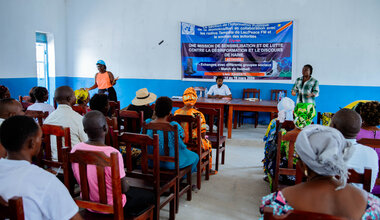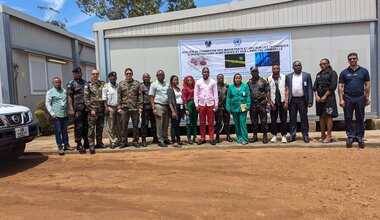Uvira (South Kivu) : Awareness Campaign to Educate Local Young People about Common Offenses
Uvira, 21 April 2015
– An awareness campaign to educate local young leaders about criminal offences ended in Uvira, South Kivu province, on Tuesday 21 April 2015.
The campaign, which included five sessions, was organized by the United Nations Joint Human Rights Office (UNJHRO), in partnership with the Public Prosecutor’s Office in the Main Court of Uvira and the Territorial Youth Council (CTJ), with the financial support of the Public Information section of MONUSCO-Uvira.
The closing session, which took place in the Methodist Church’s Reception Hall, brought together 47 young people and local leaders (including 3 women). The participants were treated to a series of presentations on common offences, the notion of human rights, as well as the role and activities of the UNJHRO.
The first presentation was by the Deputy Public Prosecutor. He first explained the concept of offense. Then, using specific examples, he discussed the principle of the legality of offenses and penalties, as established in Congolese Penal Code. He also discussed the principles that “No one is above the law” and that “No one can dispense justice on his/her own behalf”, based on Article 12 of the Constitution which states that “All Congolese are equal before the law and have the right to equal protection by the law.” The Deputy Public Prosecutor finally concluded with some examples of criminal offences and penalties: murder, rape, public breach of decency, theft, swindling, breach of trust, assault and bodily injuries, public insult, arbitrary arrest, illegal detention, etc. â
The second presentation was by the representative from the United Nations Joint Human Rights Office (UNJHRO). John Kiza first explained the notion of human rights, their sources and character. He also spoke about the UNJHRO’s mandate which consists, essentially, in monitoring the situation of human rights. Then, through practical cases, he spoke of the different activities being conducted on the ground in execution of the said mandate, namely: monitoring and reporting violations of human rights, building the capacities of State and Civil Society actors, fighting impunity for human rights violations (joint missions with the Uvira military garrison prosecutor’s office, support for the holding of mobile courts by the Uvira garrison military tribunal, etc) and protection of civilians.
The participants welcomed this awareness campaign as a timely initiative and said their expectations were fully met. In fact, as it turned out, barely 10% of them actually knew the definition of the concept of human rights prior to this session. So they thanked the organizers as well as the speakers for helping them understand these issues.
Up to them now to share the knowledge acquired during this awareness campaign with their Communities.
It should be noted that similar awareness sessions were already organized in Luvungi, Kiliba and Uvira.
Jean-Tobie Okala/MONUSCO
 ONU
ONU Nations Unies Maintien de la paix
Nations Unies Maintien de la paix


